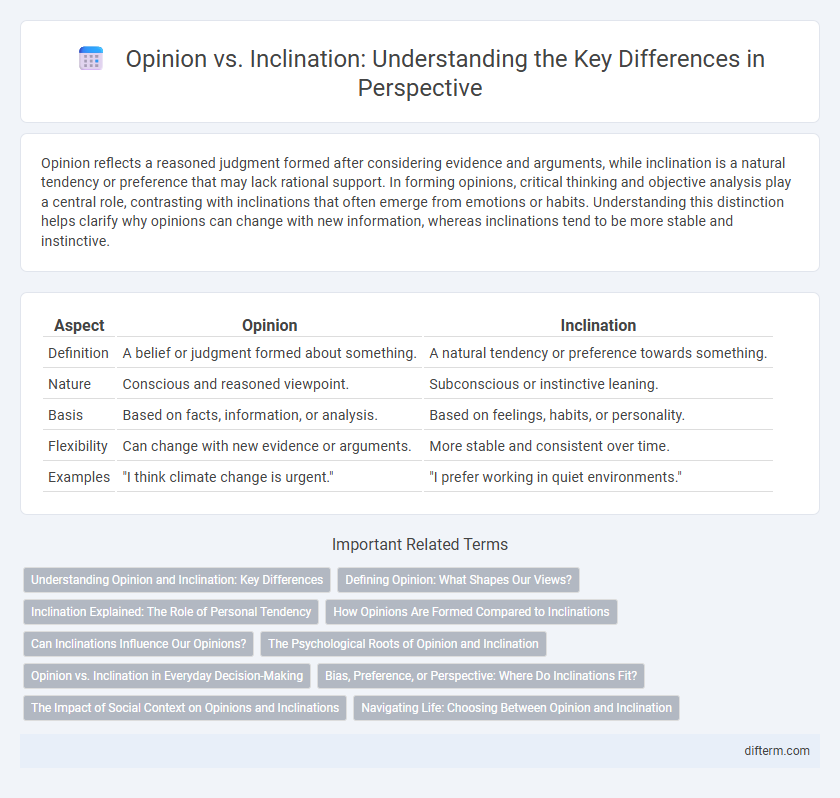Opinion reflects a reasoned judgment formed after considering evidence and arguments, while inclination is a natural tendency or preference that may lack rational support. In forming opinions, critical thinking and objective analysis play a central role, contrasting with inclinations that often emerge from emotions or habits. Understanding this distinction helps clarify why opinions can change with new information, whereas inclinations tend to be more stable and instinctive.
Table of Comparison
| Aspect | Opinion | Inclination |
|---|---|---|
| Definition | A belief or judgment formed about something. | A natural tendency or preference towards something. |
| Nature | Conscious and reasoned viewpoint. | Subconscious or instinctive leaning. |
| Basis | Based on facts, information, or analysis. | Based on feelings, habits, or personality. |
| Flexibility | Can change with new evidence or arguments. | More stable and consistent over time. |
| Examples | "I think climate change is urgent." | "I prefer working in quiet environments." |
Understanding Opinion and Inclination: Key Differences
Opinion reflects a consciously held belief or judgment shaped by evidence and reasoning, while inclination denotes a natural tendency or predisposition toward a particular preference or behavior without deliberate analysis. Recognizing the distinction helps in evaluating how decisions are formed, whether through rational assessment or inherent bias. This differentiation is critical in fields like psychology, decision theory, and social sciences to understand human motivation and behavior accurately.
Defining Opinion: What Shapes Our Views?
Opinion is a conscious belief formed through the evaluation of facts, experiences, and personal values, reflecting deliberate judgment rather than mere preference. Unlike inclination, which is a natural tendency or predisposition toward a particular choice, opinion involves critical thinking and reasoning processes that shape individual perspectives. Understanding the distinction highlights how opinions are dynamic constructs influenced by cognitive assessment and external information.
Inclination Explained: The Role of Personal Tendency
Inclination refers to an individual's natural tendency or predisposition toward certain thoughts, feelings, or behaviors, shaping their perspective without requiring conscious evaluation. While opinions are explicit judgments or beliefs formed through reasoning and experience, inclinations operate as subconscious influences guiding these judgments. Understanding inclination reveals how personal tendencies subtly affect the formation and expression of opinions, highlighting the interplay between innate bias and rational thought.
How Opinions Are Formed Compared to Inclinations
Opinions are formed through deliberate evaluation of information, experiences, and reasoning, reflecting a conscious judgment that can change with new evidence. Inclinations stem from innate tendencies, emotional responses, or subconscious biases, often shaping preferences without extensive analysis. Understanding this distinction highlights how opinions rely on cognitive processing, while inclinations are more instinctive and automatic.
Can Inclinations Influence Our Opinions?
Inclinations often serve as subconscious biases that shape the formation of opinions by guiding the attention toward specific information or experiences. Neurological studies suggest that emotional inclinations activate brain regions associated with value judgment, which can reinforce pre-existing opinions or spark new ones. Understanding the interplay between inclinations and opinions is crucial for evaluating the objectivity of personal and collective decision-making processes.
The Psychological Roots of Opinion and Inclination
Opinions often stem from conscious cognitive processes involving reasoning and evaluation, while inclinations arise more from subconscious psychological drives and emotional predispositions. The psychological roots of opinion are linked to deliberate reflection and social influences, whereas inclinations are shaped by innate tendencies and early life experiences. Understanding these distinctions reveals how individuals form judgments differently based on the interplay of rational thought and subconscious motivation.
Opinion vs. Inclination in Everyday Decision-Making
Opinion reflects a considered judgment or belief shaped by facts, experiences, and reasoning, while inclination represents a natural tendency or personal preference often driven by emotions or habits. In everyday decision-making, opinions guide rational choices based on evaluation of information, whereas inclinations influence spontaneous decisions rooted in comfort or desire. Balancing opinion and inclination helps individuals make decisions that are both thoughtful and authentic.
Bias, Preference, or Perspective: Where Do Inclinations Fit?
Inclinations represent subconscious tendencies influenced by personal bias, preference, or perspective, shaping how individuals interpret information without deliberate judgment. Unlike opinions, which are consciously formed and often articulated based on reasoning, inclinations reveal deeper, often unexamined biases that affect perception and decision-making. Understanding where inclinations fit highlights the interplay between innate predispositions and the expressed judgments of opinion.
The Impact of Social Context on Opinions and Inclinations
Opinions are articulated judgments shaped by social interactions and cultural norms, while inclinations reflect deeper, often subconscious tendencies influenced by personal experiences and environment. Social context significantly impacts opinions by providing frameworks and language for expressing viewpoints, whereas inclinations are molded more subtly through ongoing socialization and emotional resonance. Understanding this distinction highlights how group dynamics and societal expectations can transform private inclinations into public opinions.
Navigating Life: Choosing Between Opinion and Inclination
Navigating life requires discerning between opinion and inclination, as opinions are formed through conscious evaluation of facts while inclinations stem from innate or emotional tendencies. Prioritizing opinions encourages rational decision-making grounded in logic, whereas following inclinations often aligns with personal passion and authenticity. Balancing these forces enhances self-awareness and fosters decisions that are both reasoned and genuinely reflective of individual values.
opinion vs inclination Infographic

 difterm.com
difterm.com